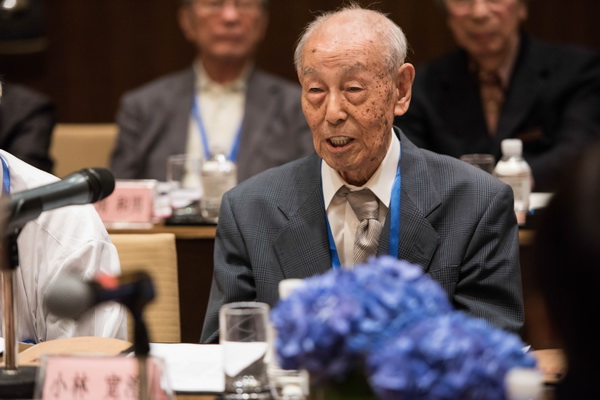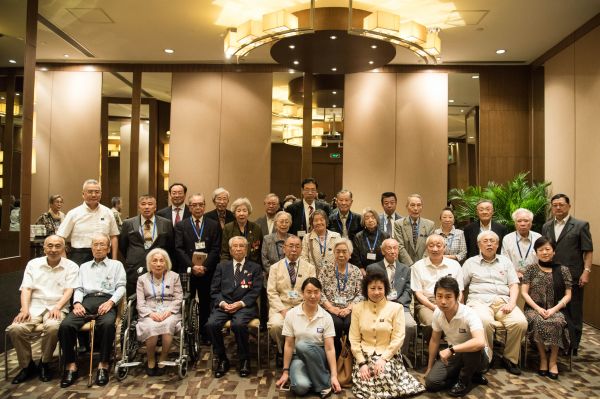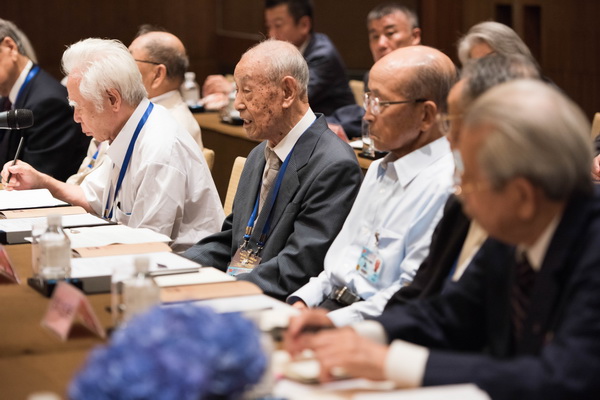
Kobayashi Kancho talks with the other 16 Japanese veterans of the Chinese People's War of Resistance Against Japanese Aggression and Liberation War and Chen Zhijian, director of the research institute of the Eighth Route Army. (Lu Xingji/China Features)
Kobayashi Kancho, 95, finds it difficult to walk. But the Japanese veteran still came to Beijing to attend the ceremony to mark the 70th anniversary of the end of World War II and the victory of the Chinese People's War of Resistance Against Japanese Aggression.
Kobayashi Kancho was among them 30 Chinese and foreign veterans and civilians who fought for China in the World War II and were granted medals by President Xi Jinping on Wednesday, ahead of the country's grand V-Day celebration.
Together with 16 Japanese veterans of the Chinese People's War of Resistance Against Japanese Aggression and Liberation War, Kobayashi held talks with Chen Zhijian, director of the research institute of the Eighth Route Army, an armed force led by the CPC during the war.
"I feel great honor and happiness being here," Kobayashi said in Chinese, his voice shaking.
Chen acknowledged their great contribution to the victory of the Chinese People's War of Resistance Against Japanese Aggression.

The veterns take group photo with Chen Zhijian (3rd right of the second front row), , director of the research institute of the Eighth Route Army, and Chen Haosu (2nd right of the second front row), director of the research institute of the New Fourth Army. (Lu Xingji/China Features)
"My father used to fight in the war," Chen said. "Thus it's just like facing him when I sit in front of you."
Kobayashi was born in Gunma, Japan in 1919. He inherited a temple from his ancestors and had been a monk since his teenage years.
In June 1939, Kobayashi received a military order to join the army. After several months training, he landed in Qingdao, east China's Shandong Province, with the Japanese army in January 1940.
He was captured by the Eighth Route Army on June 7, 1941. After capture, Kobayashi tried to commit suicide. However, the muzzle of his machine gun shifted after he pulled the trigger and he survived.
Kobayashi was kept by the Eighth Route Army and sent to its command of east Shandong detachment.
When he was first taken, he thought they would kill him. But they did not.
The Eighth Route Army gave Kobayashi medical help, food and shelter as he recovered. While recuperating, he was given Japanese-language books on Communism and Socialism.
At first, he rejected the books. But after growing restless in his small room, he finally cracked them open.
He found the books' content well thought out.
One day, he met Jiang Kun, a chief agent in the east Shandong detachment of the Eighth Route Army.
Jiang, who used to study at the University of Tokyo before Japan's full-scale invasion began during the July 7 Incident of 1937, returned to China and took part in the Chinese People's War of the Resistance Against Japanese Aggression.
He spoke fluent Japanese and sometimes talked with Kobayashi about his life in Japan, Kobayashi said.
Jiang asked for Kobayashi's help for his work. "He did not force me," he said.
Kobayashi witnessed Chinese villages burnt by the Imperial Japanese Army and innocent people killed by the Japanese soldiers.
He gradually realized the war initiated by Japan against China was a war of aggression and brought tremendous pain and suffering to the Chinese people.
He felt guilty of the Japanese atrocities to the Chinese people.
On Sept. 19, 1941, Kobayashi and his fellow Japanese soldiers joined the Eighth Route Army. They distributed anti-war leaflets, wrote slogans and made telephone calls, trying to persuade the Japanese army to surrender.
Kobayashi caught the attention of high-level Japanese leaders, who offered a reward for his capture.
Thus he was hidden in a cave where he translated the book Historical Materialism into Japanese to be used in anti-war materials.
When the war ended in 1945, Kobayashi stayed in Jinan, capital of Shandong Province. He worked at the foreign affairs office and repatriated the war prisoners and the Japanese nationals.

The veterans listen to Kobayashi's (2nd, left) talk. (Lu Xingji/Xinhua)
In 1946, under the approval of the Organization Department of the Communist Party of China's (CPC) Central Committee, Kobayashi joined the party.
In 1953, Kobayashi served as the vice director of the People's Hospital in Fengzhen of the Inner Mongolia Autonomous Region and married a Japanese nurse there.
In December of 1955, Kobayashi and his family returned to Japan with a 100,000 HK dollars subsidy. "I had worked and lived in China for 15 years," he said. "I miss the colleagues and comrades so much."
In his early years back in Japan, Kobayashi was under police surveillance, but he eventually found a job at a shipping company and worked until he turned 75.
After retirement, Kobayashi served as the chairman of an association of the Japanese veterans of the Eighth Route Army and New Fourth Army. He went around Japan and told of his anti-war experience in China to call on the people to cherish peace.

